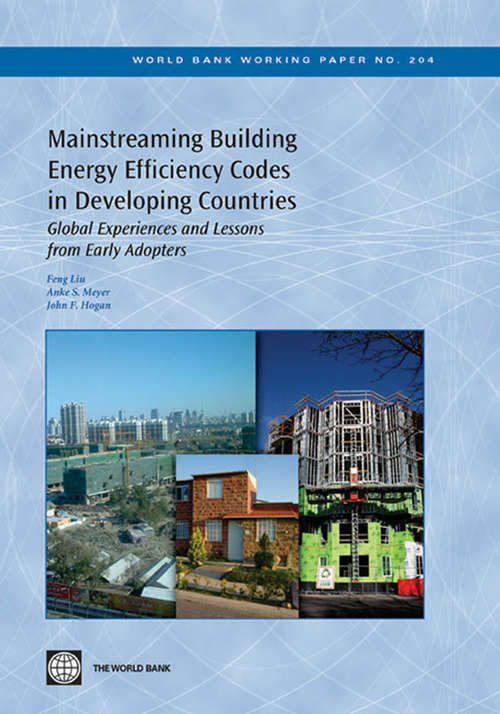Mainstreaming Building Energy Efficiency Codes in Developing Countries
By: and and
Sign Up Now!
Already a Member? Log In
You must be logged into Bookshare to access this title.
Learn about membership options,
or view our freely available titles.
- Synopsis
- Urbanization and growing wealth in developing countries portend a large increase of demand for modern energy services in residential, commercial and public-service buildings in the coming decades. Pursuing energy efficiency in buildings is vital to energy security in developing countries and is identified by the Intergovernment Panel on Climate Change as having the greatest potential for cost-effective reduction of CO2 emissions by 2030 among all energy-consuming sectors. Building energy efficiency codes (BEECs), along with energy efficiency standards for major appliances and equipment, are broadly recognized as a necessary government intervention to overcome persistent market barriers to capturing the economic potential of energy efficiency gains in the residential, commercial and public-service sectors. Implementation of BEECs help prevent costly energy wastes over the lifecycles of buildings in space heating, air conditioning, lighting, and other energy service requirements. Nonetheless, achieving the full potential of energy savings afforded by more energy-efficient buildings requires holding people who live or work in buildings accountable for the cost of energy services. Compliance enforcement has been the biggest challenge to implementing BEECs. This report summarizes the findings of an extensive literature survey of the experiences of implementing BEECs in developed countries, as well as those from case studies of China, Egypt, India, and Mexico. It also serves as a primer on the basic features and contents of BEECs and the commonly adopted compliance and enforcement approaches. This report highlights the key challenges to improving compliance enforcement in developing countries, including government commitment to energy efficiency, the effectiveness of government oversight of the construction sector, the compliance capacity of building supply chain, and financing constraints. The report notes that the process of transforming a country's building supply chain toward delivering increasingly more energy-efficient buildings takes time and requires persistent government intervention through uniformly enforced and regularly updated BEECs. The report recommends increased international support in strengthening the enforcement infrastructure for BEECs in middle-income developing countries. For low- and lower-middle-income countries, there is an urgent need to assist in improving the effectiveness of government oversight system for building construction, laying the foundation for the system to also cover BEECs.
- Copyright:
- 2010
Book Details
- Book Quality:
- Publisher Quality
- ISBN-13:
- 9780821385647
- Related ISBNs:
- 9780821385647
- Publisher:
- World Bank Publications
- Date of Addition:
- 08/16/11
- Copyrighted By:
- The World Bank
- Adult content:
- No
- Language:
- English
- Has Image Descriptions:
- No
- Categories:
- Nonfiction, Outdoors and Nature, Business and Finance, Earth Sciences, Politics and Government
- Submitted By:
- Bookshare Staff
- Usage Restrictions:
- This is a copyrighted book.
Reviews
Other Books
- by Anke S. Meyer
- by John F. Hogan
- by Feng Liu
- in Nonfiction
- in Outdoors and Nature
- in Business and Finance
- in Earth Sciences
- in Politics and Government
